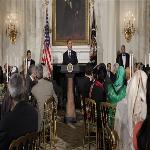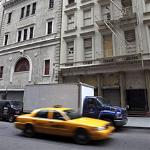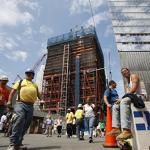17 August 2010

Photo: AP
President Barack Obama hosts an Iftar dinner, the meal that breaks the dawn-to-dusk fast for Muslims during the holy month of Ramadan, in the State Dining Room at the White House in Washington, 13 Aug 2010
President Obama's recent comments about the mosque controversy near Ground Zero in New York have elevated the issue into a national political debate, just months before congressional elections in November.
"Ground Zero is indeed hallowed ground. But let me be clear. As a citizen and as president, I believe that Muslims have the right to practice their religion as everyone else in this country, and that includes the right to build a place of worship in a community center on private property in lower Manhattan," said the president.
The day after those remarks at the White House, Mr. Obama said that although he supports the right of Muslims to build a community center and mosque near Ground Zero, he would not comment on the wisdom of doing so.
The president's comments angered many who oppose building a mosque so close to the site of the 2001 terrorist attacks. Among them is former Alaska Governor Sarah Palin, who is being urged by some conservatives to run for president in 2012.
"This hurts," she said. "This is a slap to those innocent victims who were murdered that day on 9/11 [September 11, 2001]. How else do you describe it? He just doesn't get it that this is an insensitive move."

AP
Site of a proposed mosque on Park Place in lower Manhattan in New York, 16 Aug 2010Local issue
The mosque controversy largely was a local issue in New York City before the president weighed in, and now some Republicans hope to make it part of the national debate leading up to the congressional elections in November.
New York Republican Representative Peter King spoke on NBC television's Today program. "Muslims and every other religion have the absolute right [to worship s they see fit], but with rights come responsibilities," he said. "And I strongly believe the responsible thing to do is not to build the mosque near Ground Zero. Because no one was disputing the right to do it, it was whether or not they should."
A recent CNN public opinion survey found that 68 percent of those polled oppose the Islamic center being built so close to the site of the 2001 terrorist attacks.
But President Obama is receiving some credit for standing on principle in defending those who want to build the mosque.
Nihad Awad is the Executive Director of the Council on American-Islamic Relations. He spoke with VOA's Deewa service. "These are principles of America's constitutional rights that should not be tampered with or negotiated or subjected to emotional feelings of those in opposition to the mosque that has been orchestrating this hysterical reaction by some politicians. The statement by the president was needed and timely," said Awad.
International perspective
But the statement will likely be seen differently internationally than it is at home, says John Farina, an expert on religion at George Mason University in Virginia.
"I think he intended it, from reading the text, to send a message that, 'Look, we really believe in our ideals even when they are inconvenient,' and who could object to that? That is a wonderful message. But that is not the way, at least, that Americans are going to hear it," he said.

AP
Construction workers take a lunch break from the World Trade Center site, in New York, 13 Aug 2010Political price to pay
Political analysts say that given the public's opposition to the mosque being built so close to Ground Zero, the president and his fellow Democrats could pay a political price in November.
Larry Sabato directs the Center for Politics at the University of Virginia. "It was both politically foolish and unnecessary for President Obama to take a stand on what the White House had rightly called a local issue. This has added an unnecessary burden to the Democratic candidates who are actually on the ballot in November, which, of course, Obama is not," he said.
Many Democrats would prefer not to be drawn into taking a stand on the mosque controversy. And some disagree with the president on the issue including Senate Majority Leader Harry Reid, who issued a statement saying that those building the Islamic center should look elsewhere. Reid is involved in a tight re-election battle in his home state of Nevada.
Democrats are already on the defensive because of the weak national economy. And analyst Sabato says many Democratic House and Senate candidates wish that the president had not spoken out on the mosque issue.
"He is the leader of the [Democratic] party," he said. "He is supposed to be looking out for the welfare of his troops and I don't think he did so in this case. You know, presidents learn sooner or later that it is okay to duck the occasional issue when you have reason to do so, and he clearly had reason here and the opportunity."
But Sabato notes that the economy will be the paramount election issue in November - trumping the mosque controversy, illegal immigration and a host of other challenges facing the country.